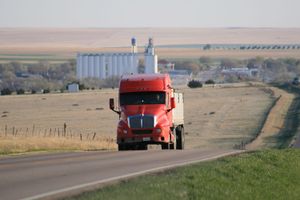Ag Suppliers Still Delivering While Keeping Their Distance
 Nothing about doing business with local ag business retailers is usual in these days of social distancing.
Nothing about doing business with local ag business retailers is usual in these days of social distancing.
“Getting equipment parts now feels like a drug deal,” tweeted Ken Franklin, Nation Farms, of Taylorville, Illinois. “Call when your 10 minutes out. I’ll leave your stuff in brown bag, under the bench, by the tree at the corner of building.”
While most farmers aren’t noting shortages of inputs or other essential supplies as spring planting kicks into gear, COVID-19 is changing many established ways of doing business.
When Weiner, Arkansas, farmer Scott Matthews needed a tire fixed this week, he headed as usual to the local co-op in Waldenburg, population 80 (according to the 2000 census).
“It was so weird. You have to call. You stay in your truck. They come out and get it, fix it and put it back in your truck. It just feels odd,” said Matthews.
This new awkwardness is even more noticeable in rural areas where business is often finalized with a hearty handshake or a slap on the back. Matthews understands the need for precautions; his own small community has had residents test positive for the novel coronavirus known as COVID-19.
“I just worry about the long-term implications if all this continues. I worry we won’t ever be the same,” he said.
Notes detailing how to contact shop owners are posted on doors all along the main business district in Arthur, Illinois. There’s an eerie quiet hovering over this typically bustling agricultural town that also relies on tourists visiting what is considered the heart of Illinois Amish Country.
It is also ordinarily the busiest time of year for Kitchen Seed Company, a family-owned purveyor of corn, soybean, small grains, cover crop and lawn seed, which operates just north of downtown Arthur.
Fortunately, such agricultural suppliers have been deemed essential and can continue to conduct business. Still, the company posted a note, locked the front door and started taking orders and payment by phone. Often, the customer is sitting in a pickup in the driveway when making the call. Mike Vanausdoll, president of Kitchen Seed Company, said the company felt it was important to take steps to distance personal interactions as much as possible during sales transactions.
“Most customers understand that we’re trying to do our part, and I know other seed companies are taking similar actions,” Vanausdoll said.
Empty interstates send another eerie clue that life has, at least temporarily, changed, said Kris Ehler. He’s been busy making seed deliveries direct to farms for his family seed company, Ehler Brothers Inc., based in Thomasboro, Illinois.
Ehler said his company has also posted a note asking patrons not to enter the office of their seed headquarters. “We’ve had a few people early on that weren’t getting the importance of distancing,” he said.
So far, getting the inputs needed to put in the crop doesn’t appear as though it will be a problem, said Sean Arians, who farms in Morrison, Illinois, and is the regional business director for Advanced Agrilytics.
“I’m not a big fan of ‘what ifs,'” said Arians. “But I am encouraging farmers to check with all their suppliers if they haven’t already taken possession of stocks for this spring.
“We put a heavy reliance on the ability to get inputs, and I don’t think any of us can afford to be shut down when things get into full swing here.”
Some custom applicators took advance measures. Conrad Smith, Smith Ag Inc., Barry, Illinois, said he received notices that trucks would be delivering product well ahead of Illinois’ stay-at-home orders.
“This situation has caused me to bring some products in that I typically wouldn’t stock until later in the spring,” he said.
The question of custom applicator availability is the one that troubles Matthews, though.
“Availability of planes, pilots and/or crews when we need them most is a serious concern for me in rice production,” he said.
Timing windows for those applications are narrow enough with weather interruptions, let alone the complications that the virus might present, he added.
As states move to extend stay-at-home orders into calendar dates that overlap with planting, farmers are encouraged to think about how to implement proactive safety protocols and plan for contingencies.
Find more information here:
A DTN/Farm Market iD survey of farmer thoughts regarding business concerns connected to COVID-19 was conducted from March 27-29, 2020. Find the details of the results here: https://www.dtnpf.com/….
Pamela Smith can be reached at pamela.smith@dtn.com
Follow her on Twitter @PamSmithDTN
Source: Pamela Smith, DTN
